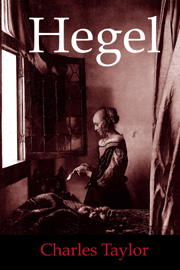Book contents
- Frontmatter
- Contents
- Preface and Acknowledgements
- Abbreviations
- German words used in text
- PART I THE CLAIMS OF SPECULATIVE REASON
- PART II PHENOMENOLOGY
- PART III LOGIC
- PART IV HISTORY AND POLITICS
- PART V ABSOLUTE SPIRIT
- XVII Art
- XVIII Religion
- XIX Philosophy
- PART VI CONCLUSION
- Biographical Note
- Bibliography
- Analytical list of main discussions
- Index
XVII - Art
Published online by Cambridge University Press: 05 June 2012
- Frontmatter
- Contents
- Preface and Acknowledgements
- Abbreviations
- German words used in text
- PART I THE CLAIMS OF SPECULATIVE REASON
- PART II PHENOMENOLOGY
- PART III LOGIC
- PART IV HISTORY AND POLITICS
- PART V ABSOLUTE SPIRIT
- XVII Art
- XVIII Religion
- XIX Philosophy
- PART VI CONCLUSION
- Biographical Note
- Bibliography
- Analytical list of main discussions
- Index
Summary
The state is the highest realization of the human community on earth. We can say that it is the highest form of human life, if we consider life-forms as a whole. But it is not yet the highest realization of spirit. For the goal of Spirit is to come to a full, that means rational, knowledge of self. We can see the state as developing in history in conformity with a plan which culminates in this self-knowledge of Geist. We saw in Chapter XIV how the basic structures of the state can be deduced from the requirements of this culmination.
But this final stage of Spirit's self-realization cannot be provided by the state. True, the state is in a sense an expression of the Idea. It is the Idea embodied in a common mode of life. It is objective spirit. But what we need now is another mode of expression which will be a vehicle of self-understanding, of pure self-contemplation. And this takes us beyond the state whose achievement is rather to realize the Idea in practices and institutions.
And the self-knowledge of Spirit must go beyond the state in another respect as well. The political community is substance of a certain people at a given epoch. But the cosmic spirit which must come to recognize himself underlies not just my own community but all of history, and beyond this the whole universe.
- Type
- Chapter
- Information
- Hegel , pp. 465 - 479Publisher: Cambridge University PressPrint publication year: 1975



